Higher Education: Schools as Organisations - Unit 2 Assessment Tasks
VerifiedAdded on 2020/06/05
|45
|14466
|227
Homework Assignment
AI Summary
This assignment explores schools as organizations, encompassing early years education, different school types, and post-16 options for young people and adults. It summarizes entitlement and provision for early years education, explaining the characteristics of state and independent schools in relation to educational stages and governance. The assignment also outlines post-16 options, including further education, employment, and training. Furthermore, it delves into the strategic purpose of school leaders and governors, highlighting their roles in school administration, policy development, and performance monitoring. The solution offers a comprehensive overview of school structures, governance, and the responsibilities of key stakeholders within the educational system.
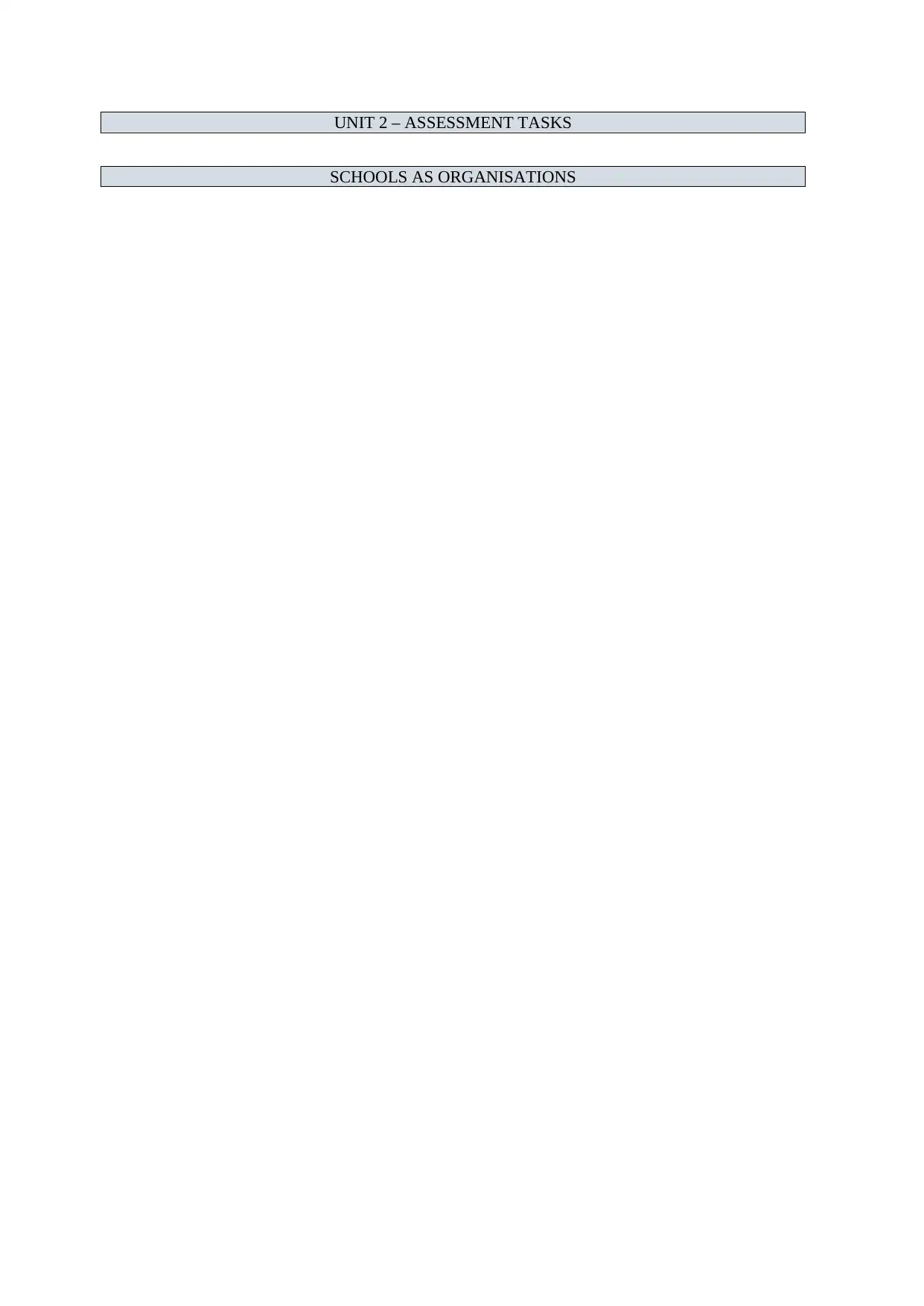
UNIT 2 – ASSESSMENT TASKS
SCHOOLS AS ORGANISATIONS
SCHOOLS AS ORGANISATIONS
Paraphrase This Document
Need a fresh take? Get an instant paraphrase of this document with our AI Paraphraser
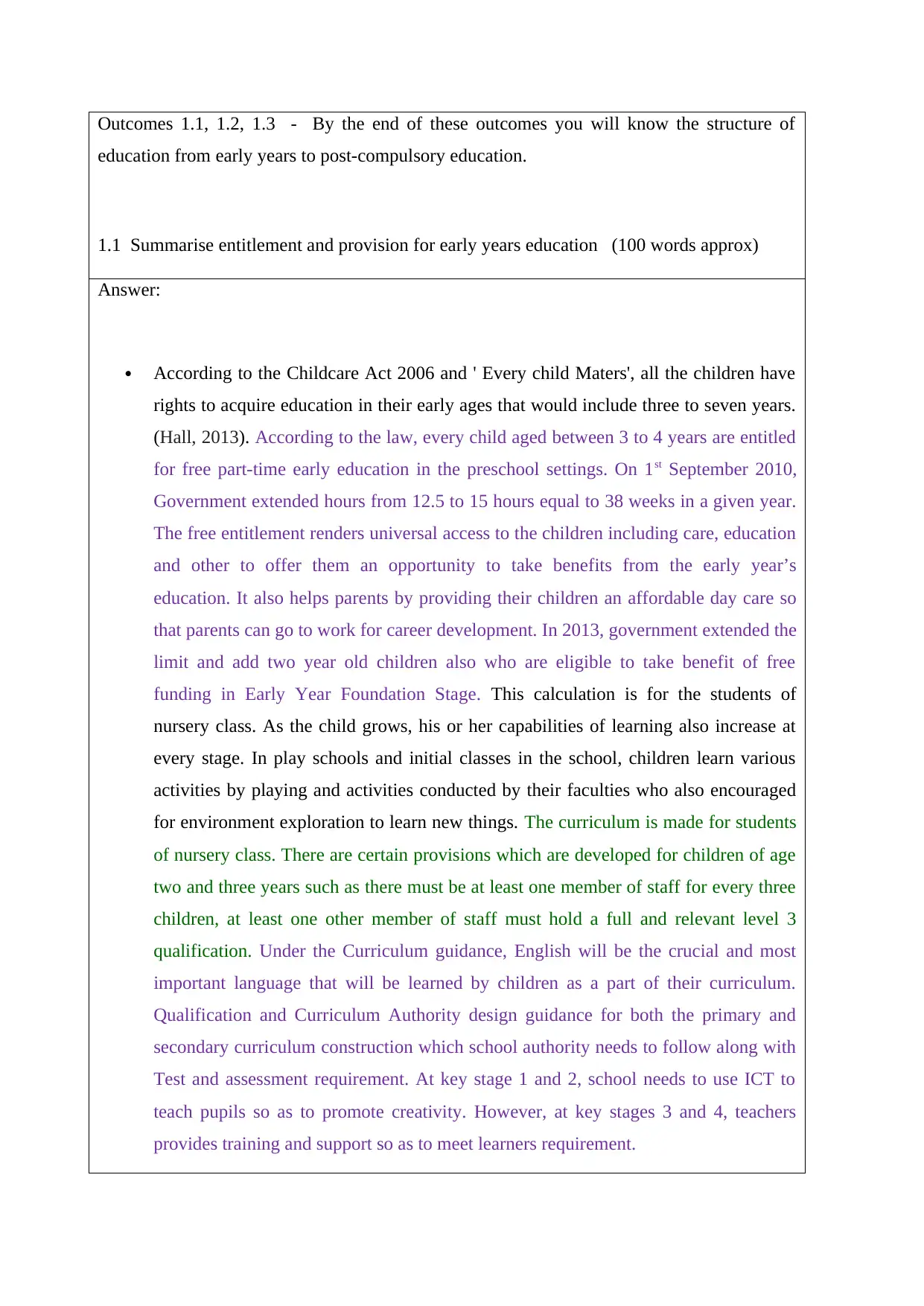
Outcomes 1.1, 1.2, 1.3 - By the end of these outcomes you will know the structure of
education from early years to post-compulsory education.
1.1 Summarise entitlement and provision for early years education (100 words approx)
Answer:
According to the Childcare Act 2006 and ' Every child Maters', all the children have
rights to acquire education in their early ages that would include three to seven years.
(Hall, 2013). According to the law, every child aged between 3 to 4 years are entitled
for free part-time early education in the preschool settings. On 1st September 2010,
Government extended hours from 12.5 to 15 hours equal to 38 weeks in a given year.
The free entitlement renders universal access to the children including care, education
and other to offer them an opportunity to take benefits from the early year’s
education. It also helps parents by providing their children an affordable day care so
that parents can go to work for career development. In 2013, government extended the
limit and add two year old children also who are eligible to take benefit of free
funding in Early Year Foundation Stage. This calculation is for the students of
nursery class. As the child grows, his or her capabilities of learning also increase at
every stage. In play schools and initial classes in the school, children learn various
activities by playing and activities conducted by their faculties who also encouraged
for environment exploration to learn new things. The curriculum is made for students
of nursery class. There are certain provisions which are developed for children of age
two and three years such as there must be at least one member of staff for every three
children, at least one other member of staff must hold a full and relevant level 3
qualification. Under the Curriculum guidance, English will be the crucial and most
important language that will be learned by children as a part of their curriculum.
Qualification and Curriculum Authority design guidance for both the primary and
secondary curriculum construction which school authority needs to follow along with
Test and assessment requirement. At key stage 1 and 2, school needs to use ICT to
teach pupils so as to promote creativity. However, at key stages 3 and 4, teachers
provides training and support so as to meet learners requirement.
education from early years to post-compulsory education.
1.1 Summarise entitlement and provision for early years education (100 words approx)
Answer:
According to the Childcare Act 2006 and ' Every child Maters', all the children have
rights to acquire education in their early ages that would include three to seven years.
(Hall, 2013). According to the law, every child aged between 3 to 4 years are entitled
for free part-time early education in the preschool settings. On 1st September 2010,
Government extended hours from 12.5 to 15 hours equal to 38 weeks in a given year.
The free entitlement renders universal access to the children including care, education
and other to offer them an opportunity to take benefits from the early year’s
education. It also helps parents by providing their children an affordable day care so
that parents can go to work for career development. In 2013, government extended the
limit and add two year old children also who are eligible to take benefit of free
funding in Early Year Foundation Stage. This calculation is for the students of
nursery class. As the child grows, his or her capabilities of learning also increase at
every stage. In play schools and initial classes in the school, children learn various
activities by playing and activities conducted by their faculties who also encouraged
for environment exploration to learn new things. The curriculum is made for students
of nursery class. There are certain provisions which are developed for children of age
two and three years such as there must be at least one member of staff for every three
children, at least one other member of staff must hold a full and relevant level 3
qualification. Under the Curriculum guidance, English will be the crucial and most
important language that will be learned by children as a part of their curriculum.
Qualification and Curriculum Authority design guidance for both the primary and
secondary curriculum construction which school authority needs to follow along with
Test and assessment requirement. At key stage 1 and 2, school needs to use ICT to
teach pupils so as to promote creativity. However, at key stages 3 and 4, teachers
provides training and support so as to meet learners requirement.
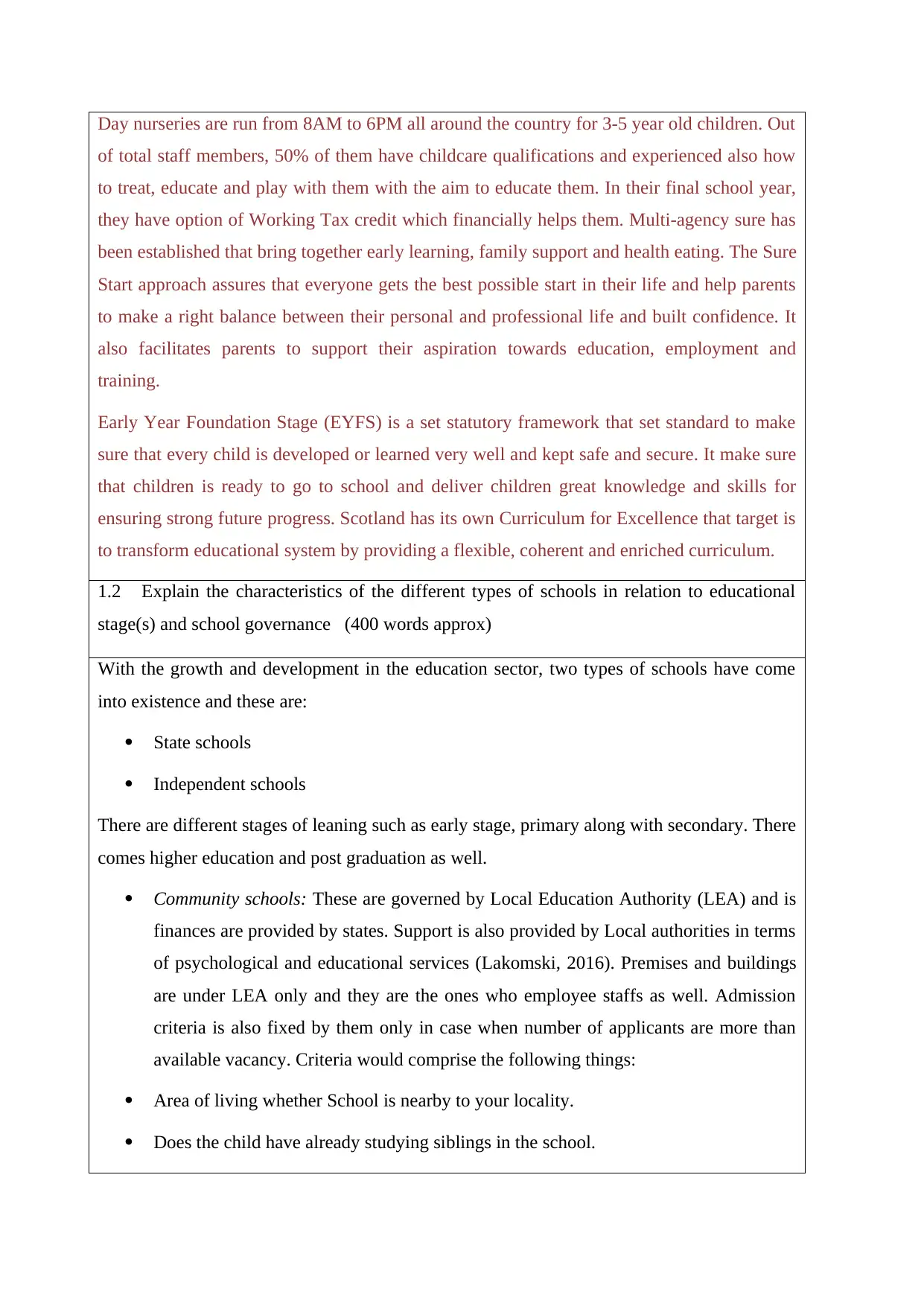
Day nurseries are run from 8AM to 6PM all around the country for 3-5 year old children. Out
of total staff members, 50% of them have childcare qualifications and experienced also how
to treat, educate and play with them with the aim to educate them. In their final school year,
they have option of Working Tax credit which financially helps them. Multi-agency sure has
been established that bring together early learning, family support and health eating. The Sure
Start approach assures that everyone gets the best possible start in their life and help parents
to make a right balance between their personal and professional life and built confidence. It
also facilitates parents to support their aspiration towards education, employment and
training.
Early Year Foundation Stage (EYFS) is a set statutory framework that set standard to make
sure that every child is developed or learned very well and kept safe and secure. It make sure
that children is ready to go to school and deliver children great knowledge and skills for
ensuring strong future progress. Scotland has its own Curriculum for Excellence that target is
to transform educational system by providing a flexible, coherent and enriched curriculum.
1.2 Explain the characteristics of the different types of schools in relation to educational
stage(s) and school governance (400 words approx)
With the growth and development in the education sector, two types of schools have come
into existence and these are:
State schools
Independent schools
There are different stages of leaning such as early stage, primary along with secondary. There
comes higher education and post graduation as well.
Community schools: These are governed by Local Education Authority (LEA) and is
finances are provided by states. Support is also provided by Local authorities in terms
of psychological and educational services (Lakomski, 2016). Premises and buildings
are under LEA only and they are the ones who employee staffs as well. Admission
criteria is also fixed by them only in case when number of applicants are more than
available vacancy. Criteria would comprise the following things:
Area of living whether School is nearby to your locality.
Does the child have already studying siblings in the school.
of total staff members, 50% of them have childcare qualifications and experienced also how
to treat, educate and play with them with the aim to educate them. In their final school year,
they have option of Working Tax credit which financially helps them. Multi-agency sure has
been established that bring together early learning, family support and health eating. The Sure
Start approach assures that everyone gets the best possible start in their life and help parents
to make a right balance between their personal and professional life and built confidence. It
also facilitates parents to support their aspiration towards education, employment and
training.
Early Year Foundation Stage (EYFS) is a set statutory framework that set standard to make
sure that every child is developed or learned very well and kept safe and secure. It make sure
that children is ready to go to school and deliver children great knowledge and skills for
ensuring strong future progress. Scotland has its own Curriculum for Excellence that target is
to transform educational system by providing a flexible, coherent and enriched curriculum.
1.2 Explain the characteristics of the different types of schools in relation to educational
stage(s) and school governance (400 words approx)
With the growth and development in the education sector, two types of schools have come
into existence and these are:
State schools
Independent schools
There are different stages of leaning such as early stage, primary along with secondary. There
comes higher education and post graduation as well.
Community schools: These are governed by Local Education Authority (LEA) and is
finances are provided by states. Support is also provided by Local authorities in terms
of psychological and educational services (Lakomski, 2016). Premises and buildings
are under LEA only and they are the ones who employee staffs as well. Admission
criteria is also fixed by them only in case when number of applicants are more than
available vacancy. Criteria would comprise the following things:
Area of living whether School is nearby to your locality.
Does the child have already studying siblings in the school.
⊘ This is a preview!⊘
Do you want full access?
Subscribe today to unlock all pages.

Trusted by 1+ million students worldwide
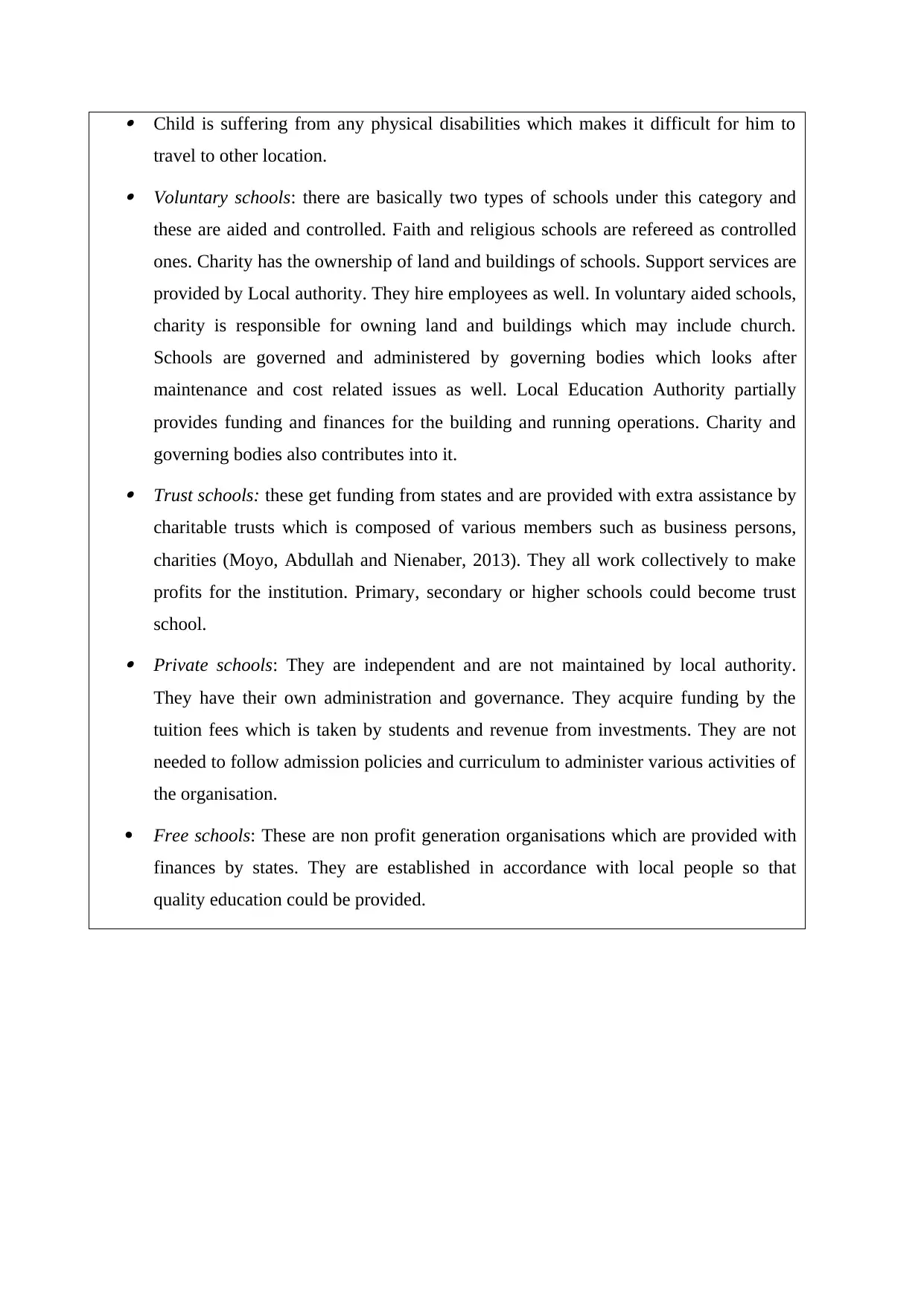
Child is suffering from any physical disabilities which makes it difficult for him to
travel to other location. Voluntary schools: there are basically two types of schools under this category and
these are aided and controlled. Faith and religious schools are refereed as controlled
ones. Charity has the ownership of land and buildings of schools. Support services are
provided by Local authority. They hire employees as well. In voluntary aided schools,
charity is responsible for owning land and buildings which may include church.
Schools are governed and administered by governing bodies which looks after
maintenance and cost related issues as well. Local Education Authority partially
provides funding and finances for the building and running operations. Charity and
governing bodies also contributes into it. Trust schools: these get funding from states and are provided with extra assistance by
charitable trusts which is composed of various members such as business persons,
charities (Moyo, Abdullah and Nienaber, 2013). They all work collectively to make
profits for the institution. Primary, secondary or higher schools could become trust
school. Private schools: They are independent and are not maintained by local authority.
They have their own administration and governance. They acquire funding by the
tuition fees which is taken by students and revenue from investments. They are not
needed to follow admission policies and curriculum to administer various activities of
the organisation.
Free schools: These are non profit generation organisations which are provided with
finances by states. They are established in accordance with local people so that
quality education could be provided.
travel to other location. Voluntary schools: there are basically two types of schools under this category and
these are aided and controlled. Faith and religious schools are refereed as controlled
ones. Charity has the ownership of land and buildings of schools. Support services are
provided by Local authority. They hire employees as well. In voluntary aided schools,
charity is responsible for owning land and buildings which may include church.
Schools are governed and administered by governing bodies which looks after
maintenance and cost related issues as well. Local Education Authority partially
provides funding and finances for the building and running operations. Charity and
governing bodies also contributes into it. Trust schools: these get funding from states and are provided with extra assistance by
charitable trusts which is composed of various members such as business persons,
charities (Moyo, Abdullah and Nienaber, 2013). They all work collectively to make
profits for the institution. Primary, secondary or higher schools could become trust
school. Private schools: They are independent and are not maintained by local authority.
They have their own administration and governance. They acquire funding by the
tuition fees which is taken by students and revenue from investments. They are not
needed to follow admission policies and curriculum to administer various activities of
the organisation.
Free schools: These are non profit generation organisations which are provided with
finances by states. They are established in accordance with local people so that
quality education could be provided.
Paraphrase This Document
Need a fresh take? Get an instant paraphrase of this document with our AI Paraphraser
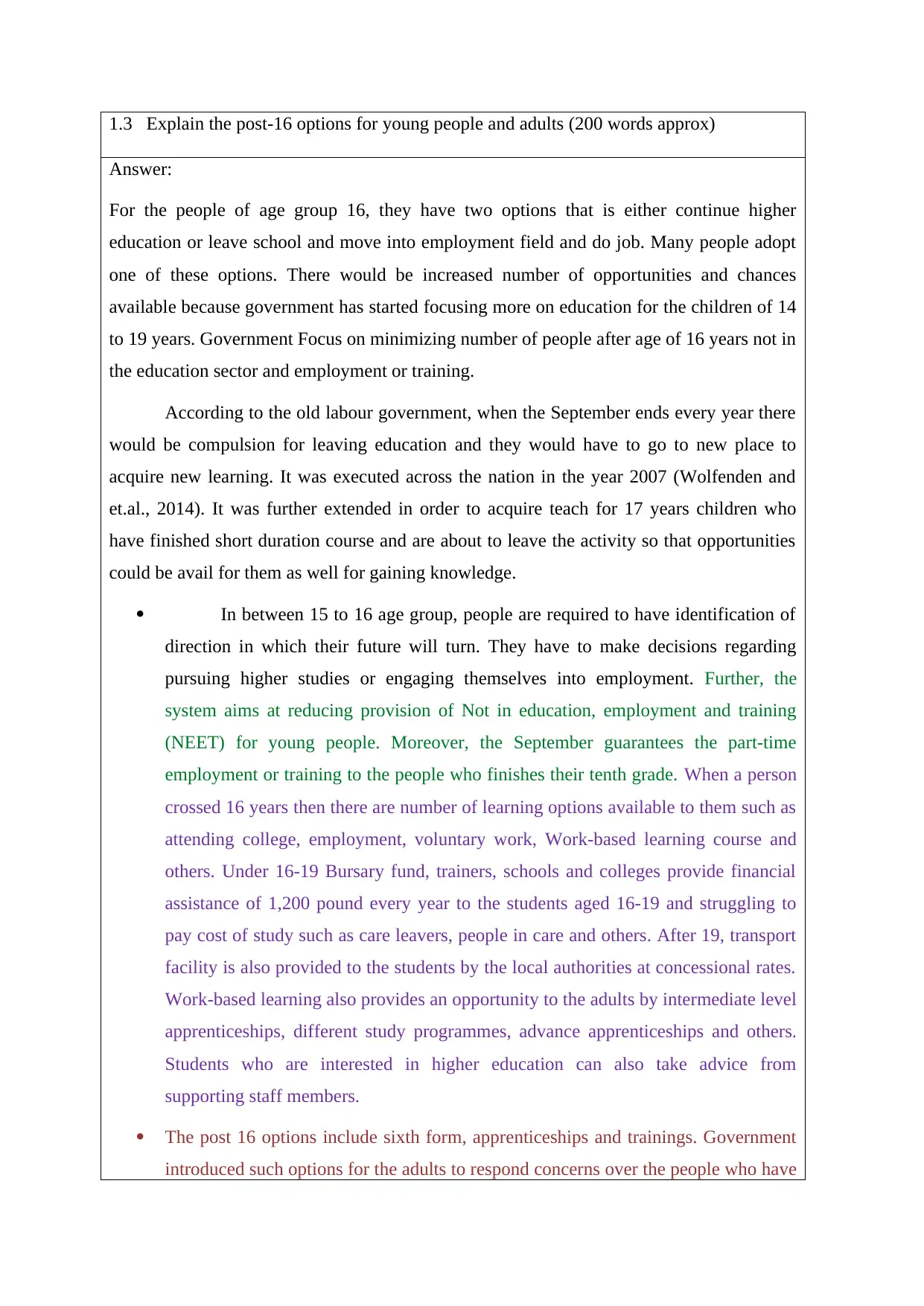
1.3 Explain the post-16 options for young people and adults (200 words approx)
Answer:
For the people of age group 16, they have two options that is either continue higher
education or leave school and move into employment field and do job. Many people adopt
one of these options. There would be increased number of opportunities and chances
available because government has started focusing more on education for the children of 14
to 19 years. Government Focus on minimizing number of people after age of 16 years not in
the education sector and employment or training.
According to the old labour government, when the September ends every year there
would be compulsion for leaving education and they would have to go to new place to
acquire new learning. It was executed across the nation in the year 2007 (Wolfenden and
et.al., 2014). It was further extended in order to acquire teach for 17 years children who
have finished short duration course and are about to leave the activity so that opportunities
could be avail for them as well for gaining knowledge.
In between 15 to 16 age group, people are required to have identification of
direction in which their future will turn. They have to make decisions regarding
pursuing higher studies or engaging themselves into employment. Further, the
system aims at reducing provision of Not in education, employment and training
(NEET) for young people. Moreover, the September guarantees the part-time
employment or training to the people who finishes their tenth grade. When a person
crossed 16 years then there are number of learning options available to them such as
attending college, employment, voluntary work, Work-based learning course and
others. Under 16-19 Bursary fund, trainers, schools and colleges provide financial
assistance of 1,200 pound every year to the students aged 16-19 and struggling to
pay cost of study such as care leavers, people in care and others. After 19, transport
facility is also provided to the students by the local authorities at concessional rates.
Work-based learning also provides an opportunity to the adults by intermediate level
apprenticeships, different study programmes, advance apprenticeships and others.
Students who are interested in higher education can also take advice from
supporting staff members.
The post 16 options include sixth form, apprenticeships and trainings. Government
introduced such options for the adults to respond concerns over the people who have
Answer:
For the people of age group 16, they have two options that is either continue higher
education or leave school and move into employment field and do job. Many people adopt
one of these options. There would be increased number of opportunities and chances
available because government has started focusing more on education for the children of 14
to 19 years. Government Focus on minimizing number of people after age of 16 years not in
the education sector and employment or training.
According to the old labour government, when the September ends every year there
would be compulsion for leaving education and they would have to go to new place to
acquire new learning. It was executed across the nation in the year 2007 (Wolfenden and
et.al., 2014). It was further extended in order to acquire teach for 17 years children who
have finished short duration course and are about to leave the activity so that opportunities
could be avail for them as well for gaining knowledge.
In between 15 to 16 age group, people are required to have identification of
direction in which their future will turn. They have to make decisions regarding
pursuing higher studies or engaging themselves into employment. Further, the
system aims at reducing provision of Not in education, employment and training
(NEET) for young people. Moreover, the September guarantees the part-time
employment or training to the people who finishes their tenth grade. When a person
crossed 16 years then there are number of learning options available to them such as
attending college, employment, voluntary work, Work-based learning course and
others. Under 16-19 Bursary fund, trainers, schools and colleges provide financial
assistance of 1,200 pound every year to the students aged 16-19 and struggling to
pay cost of study such as care leavers, people in care and others. After 19, transport
facility is also provided to the students by the local authorities at concessional rates.
Work-based learning also provides an opportunity to the adults by intermediate level
apprenticeships, different study programmes, advance apprenticeships and others.
Students who are interested in higher education can also take advice from
supporting staff members.
The post 16 options include sixth form, apprenticeships and trainings. Government
introduced such options for the adults to respond concerns over the people who have
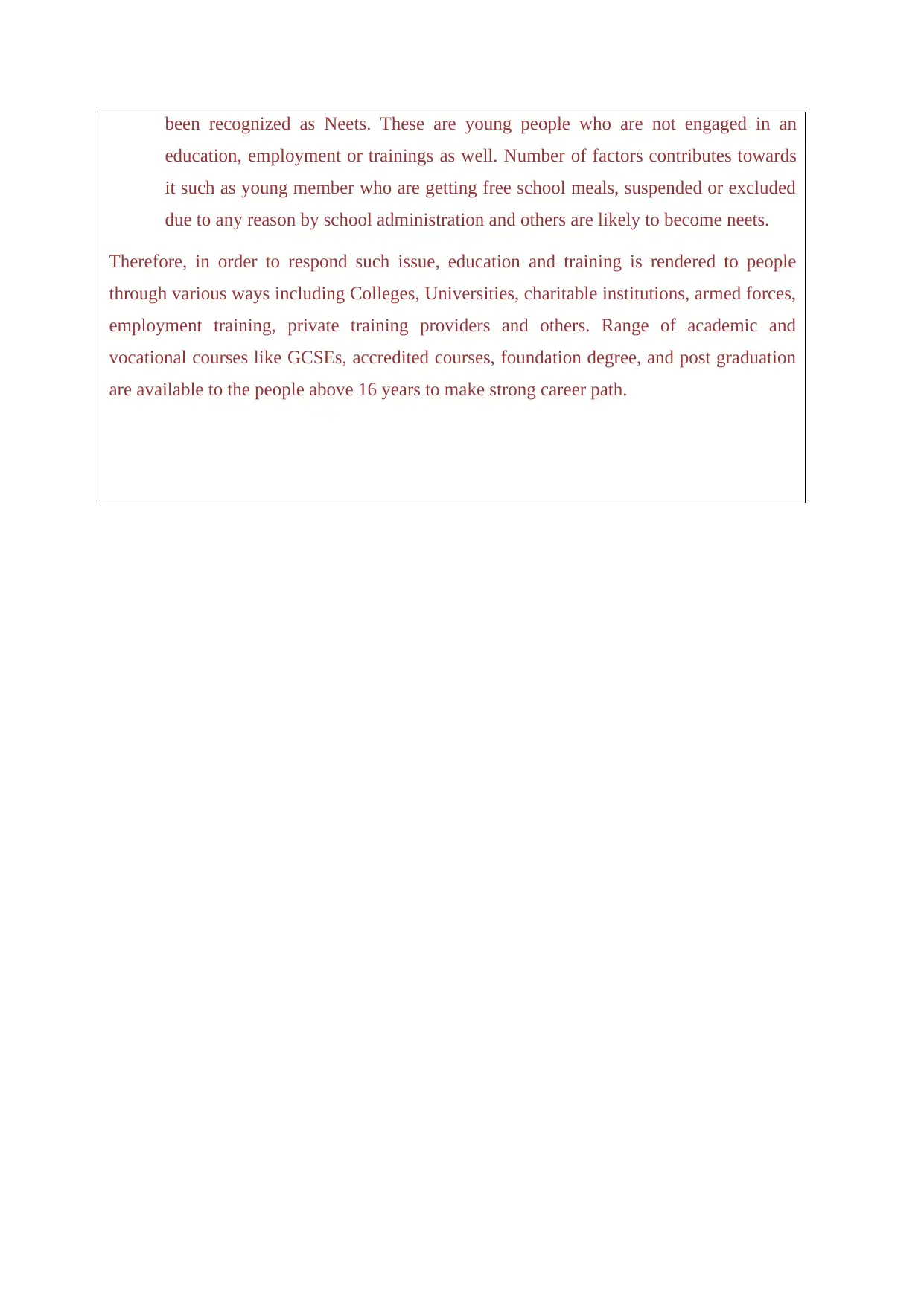
been recognized as Neets. These are young people who are not engaged in an
education, employment or trainings as well. Number of factors contributes towards
it such as young member who are getting free school meals, suspended or excluded
due to any reason by school administration and others are likely to become neets.
Therefore, in order to respond such issue, education and training is rendered to people
through various ways including Colleges, Universities, charitable institutions, armed forces,
employment training, private training providers and others. Range of academic and
vocational courses like GCSEs, accredited courses, foundation degree, and post graduation
are available to the people above 16 years to make strong career path.
education, employment or trainings as well. Number of factors contributes towards
it such as young member who are getting free school meals, suspended or excluded
due to any reason by school administration and others are likely to become neets.
Therefore, in order to respond such issue, education and training is rendered to people
through various ways including Colleges, Universities, charitable institutions, armed forces,
employment training, private training providers and others. Range of academic and
vocational courses like GCSEs, accredited courses, foundation degree, and post graduation
are available to the people above 16 years to make strong career path.
⊘ This is a preview!⊘
Do you want full access?
Subscribe today to unlock all pages.

Trusted by 1+ million students worldwide
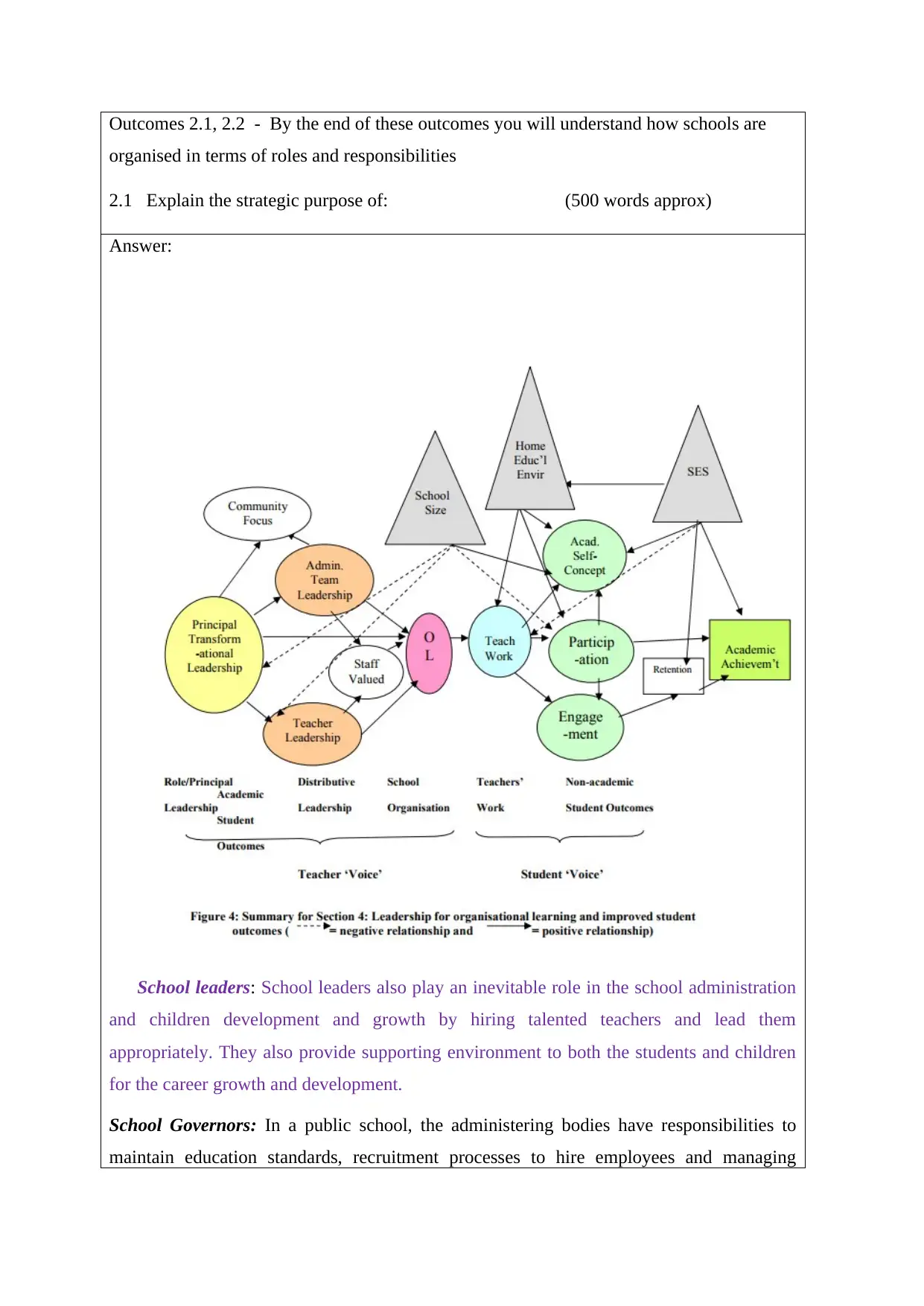
Outcomes 2.1, 2.2 - By the end of these outcomes you will understand how schools are
organised in terms of roles and responsibilities
2.1 Explain the strategic purpose of: (500 words approx)
Answer:
School leaders: School leaders also play an inevitable role in the school administration
and children development and growth by hiring talented teachers and lead them
appropriately. They also provide supporting environment to both the students and children
for the career growth and development.
School Governors: In a public school, the administering bodies have responsibilities to
maintain education standards, recruitment processes to hire employees and managing
organised in terms of roles and responsibilities
2.1 Explain the strategic purpose of: (500 words approx)
Answer:
School leaders: School leaders also play an inevitable role in the school administration
and children development and growth by hiring talented teachers and lead them
appropriately. They also provide supporting environment to both the students and children
for the career growth and development.
School Governors: In a public school, the administering bodies have responsibilities to
maintain education standards, recruitment processes to hire employees and managing
Paraphrase This Document
Need a fresh take? Get an instant paraphrase of this document with our AI Paraphraser
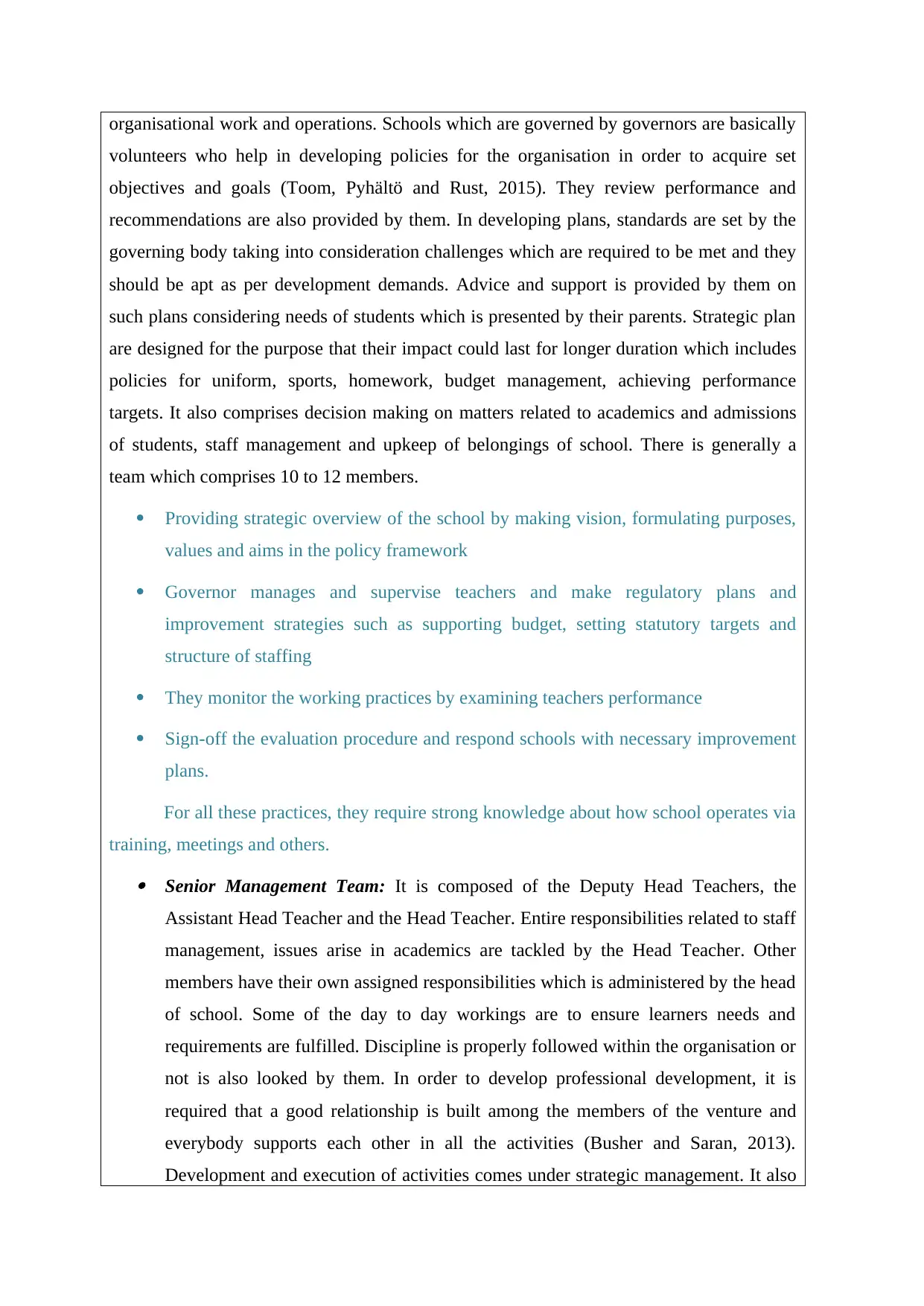
organisational work and operations. Schools which are governed by governors are basically
volunteers who help in developing policies for the organisation in order to acquire set
objectives and goals (Toom, Pyhältö and Rust, 2015). They review performance and
recommendations are also provided by them. In developing plans, standards are set by the
governing body taking into consideration challenges which are required to be met and they
should be apt as per development demands. Advice and support is provided by them on
such plans considering needs of students which is presented by their parents. Strategic plan
are designed for the purpose that their impact could last for longer duration which includes
policies for uniform, sports, homework, budget management, achieving performance
targets. It also comprises decision making on matters related to academics and admissions
of students, staff management and upkeep of belongings of school. There is generally a
team which comprises 10 to 12 members.
Providing strategic overview of the school by making vision, formulating purposes,
values and aims in the policy framework
Governor manages and supervise teachers and make regulatory plans and
improvement strategies such as supporting budget, setting statutory targets and
structure of staffing
They monitor the working practices by examining teachers performance
Sign-off the evaluation procedure and respond schools with necessary improvement
plans.
For all these practices, they require strong knowledge about how school operates via
training, meetings and others. Senior Management Team: It is composed of the Deputy Head Teachers, the
Assistant Head Teacher and the Head Teacher. Entire responsibilities related to staff
management, issues arise in academics are tackled by the Head Teacher. Other
members have their own assigned responsibilities which is administered by the head
of school. Some of the day to day workings are to ensure learners needs and
requirements are fulfilled. Discipline is properly followed within the organisation or
not is also looked by them. In order to develop professional development, it is
required that a good relationship is built among the members of the venture and
everybody supports each other in all the activities (Busher and Saran, 2013).
Development and execution of activities comes under strategic management. It also
volunteers who help in developing policies for the organisation in order to acquire set
objectives and goals (Toom, Pyhältö and Rust, 2015). They review performance and
recommendations are also provided by them. In developing plans, standards are set by the
governing body taking into consideration challenges which are required to be met and they
should be apt as per development demands. Advice and support is provided by them on
such plans considering needs of students which is presented by their parents. Strategic plan
are designed for the purpose that their impact could last for longer duration which includes
policies for uniform, sports, homework, budget management, achieving performance
targets. It also comprises decision making on matters related to academics and admissions
of students, staff management and upkeep of belongings of school. There is generally a
team which comprises 10 to 12 members.
Providing strategic overview of the school by making vision, formulating purposes,
values and aims in the policy framework
Governor manages and supervise teachers and make regulatory plans and
improvement strategies such as supporting budget, setting statutory targets and
structure of staffing
They monitor the working practices by examining teachers performance
Sign-off the evaluation procedure and respond schools with necessary improvement
plans.
For all these practices, they require strong knowledge about how school operates via
training, meetings and others. Senior Management Team: It is composed of the Deputy Head Teachers, the
Assistant Head Teacher and the Head Teacher. Entire responsibilities related to staff
management, issues arise in academics are tackled by the Head Teacher. Other
members have their own assigned responsibilities which is administered by the head
of school. Some of the day to day workings are to ensure learners needs and
requirements are fulfilled. Discipline is properly followed within the organisation or
not is also looked by them. In order to develop professional development, it is
required that a good relationship is built among the members of the venture and
everybody supports each other in all the activities (Busher and Saran, 2013).
Development and execution of activities comes under strategic management. It also
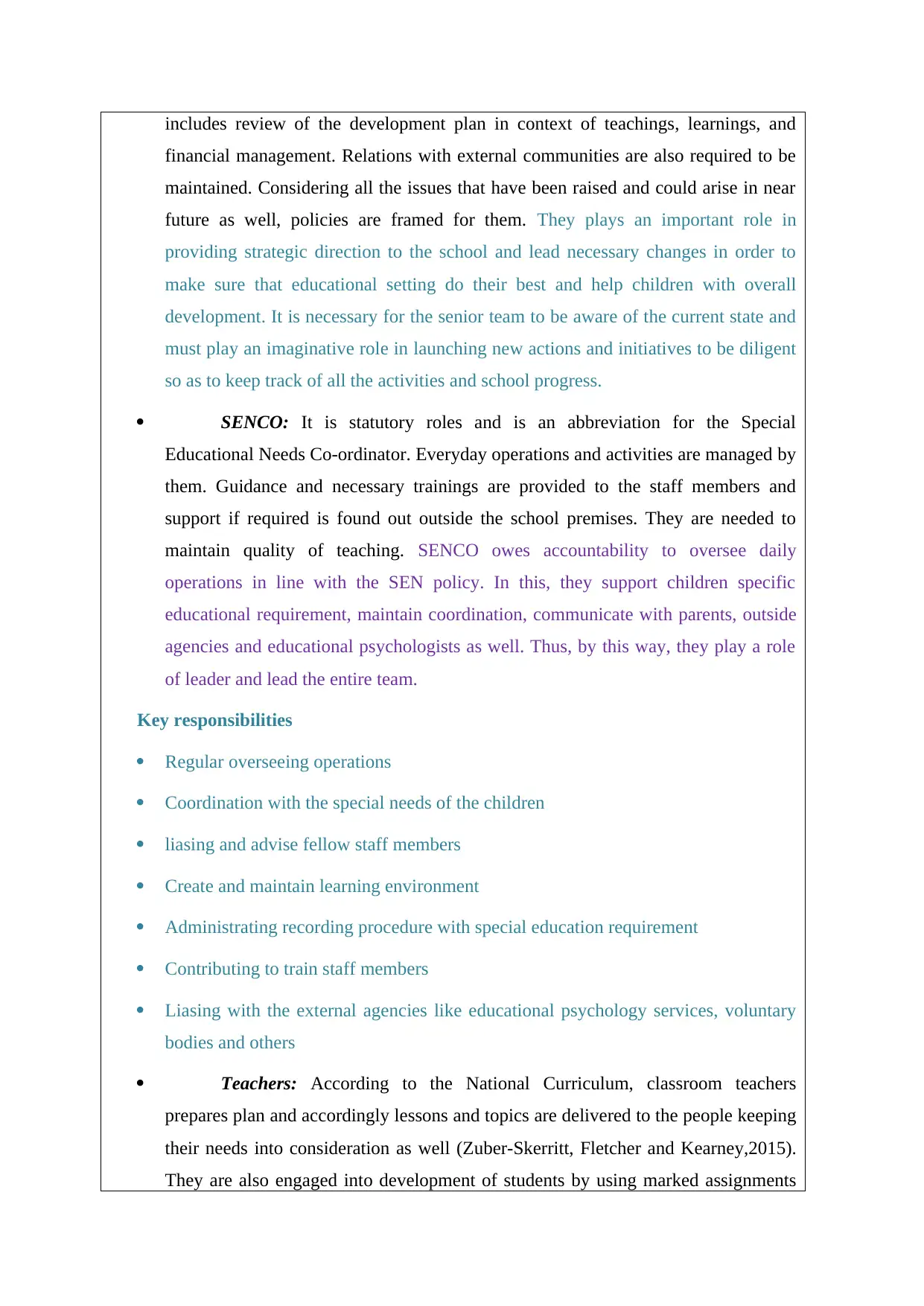
includes review of the development plan in context of teachings, learnings, and
financial management. Relations with external communities are also required to be
maintained. Considering all the issues that have been raised and could arise in near
future as well, policies are framed for them. They plays an important role in
providing strategic direction to the school and lead necessary changes in order to
make sure that educational setting do their best and help children with overall
development. It is necessary for the senior team to be aware of the current state and
must play an imaginative role in launching new actions and initiatives to be diligent
so as to keep track of all the activities and school progress.
SENCO: It is statutory roles and is an abbreviation for the Special
Educational Needs Co-ordinator. Everyday operations and activities are managed by
them. Guidance and necessary trainings are provided to the staff members and
support if required is found out outside the school premises. They are needed to
maintain quality of teaching. SENCO owes accountability to oversee daily
operations in line with the SEN policy. In this, they support children specific
educational requirement, maintain coordination, communicate with parents, outside
agencies and educational psychologists as well. Thus, by this way, they play a role
of leader and lead the entire team.
Key responsibilities
Regular overseeing operations
Coordination with the special needs of the children
liasing and advise fellow staff members
Create and maintain learning environment
Administrating recording procedure with special education requirement
Contributing to train staff members
Liasing with the external agencies like educational psychology services, voluntary
bodies and others
Teachers: According to the National Curriculum, classroom teachers
prepares plan and accordingly lessons and topics are delivered to the people keeping
their needs into consideration as well (Zuber-Skerritt, Fletcher and Kearney,2015).
They are also engaged into development of students by using marked assignments
financial management. Relations with external communities are also required to be
maintained. Considering all the issues that have been raised and could arise in near
future as well, policies are framed for them. They plays an important role in
providing strategic direction to the school and lead necessary changes in order to
make sure that educational setting do their best and help children with overall
development. It is necessary for the senior team to be aware of the current state and
must play an imaginative role in launching new actions and initiatives to be diligent
so as to keep track of all the activities and school progress.
SENCO: It is statutory roles and is an abbreviation for the Special
Educational Needs Co-ordinator. Everyday operations and activities are managed by
them. Guidance and necessary trainings are provided to the staff members and
support if required is found out outside the school premises. They are needed to
maintain quality of teaching. SENCO owes accountability to oversee daily
operations in line with the SEN policy. In this, they support children specific
educational requirement, maintain coordination, communicate with parents, outside
agencies and educational psychologists as well. Thus, by this way, they play a role
of leader and lead the entire team.
Key responsibilities
Regular overseeing operations
Coordination with the special needs of the children
liasing and advise fellow staff members
Create and maintain learning environment
Administrating recording procedure with special education requirement
Contributing to train staff members
Liasing with the external agencies like educational psychology services, voluntary
bodies and others
Teachers: According to the National Curriculum, classroom teachers
prepares plan and accordingly lessons and topics are delivered to the people keeping
their needs into consideration as well (Zuber-Skerritt, Fletcher and Kearney,2015).
They are also engaged into development of students by using marked assignments
⊘ This is a preview!⊘
Do you want full access?
Subscribe today to unlock all pages.

Trusted by 1+ million students worldwide
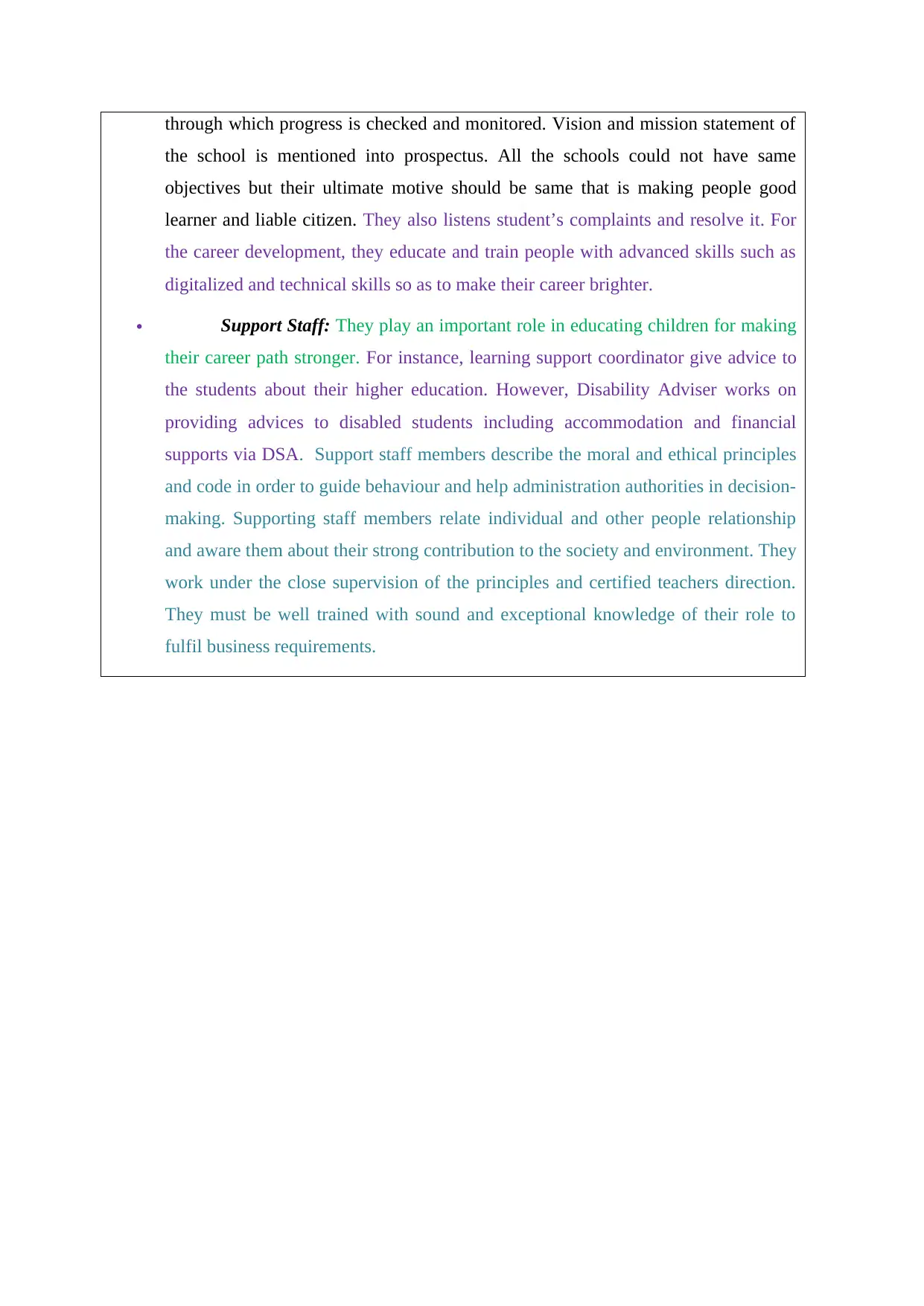
through which progress is checked and monitored. Vision and mission statement of
the school is mentioned into prospectus. All the schools could not have same
objectives but their ultimate motive should be same that is making people good
learner and liable citizen. They also listens student’s complaints and resolve it. For
the career development, they educate and train people with advanced skills such as
digitalized and technical skills so as to make their career brighter.
Support Staff: They play an important role in educating children for making
their career path stronger. For instance, learning support coordinator give advice to
the students about their higher education. However, Disability Adviser works on
providing advices to disabled students including accommodation and financial
supports via DSA. Support staff members describe the moral and ethical principles
and code in order to guide behaviour and help administration authorities in decision-
making. Supporting staff members relate individual and other people relationship
and aware them about their strong contribution to the society and environment. They
work under the close supervision of the principles and certified teachers direction.
They must be well trained with sound and exceptional knowledge of their role to
fulfil business requirements.
the school is mentioned into prospectus. All the schools could not have same
objectives but their ultimate motive should be same that is making people good
learner and liable citizen. They also listens student’s complaints and resolve it. For
the career development, they educate and train people with advanced skills such as
digitalized and technical skills so as to make their career brighter.
Support Staff: They play an important role in educating children for making
their career path stronger. For instance, learning support coordinator give advice to
the students about their higher education. However, Disability Adviser works on
providing advices to disabled students including accommodation and financial
supports via DSA. Support staff members describe the moral and ethical principles
and code in order to guide behaviour and help administration authorities in decision-
making. Supporting staff members relate individual and other people relationship
and aware them about their strong contribution to the society and environment. They
work under the close supervision of the principles and certified teachers direction.
They must be well trained with sound and exceptional knowledge of their role to
fulfil business requirements.
Paraphrase This Document
Need a fresh take? Get an instant paraphrase of this document with our AI Paraphraser
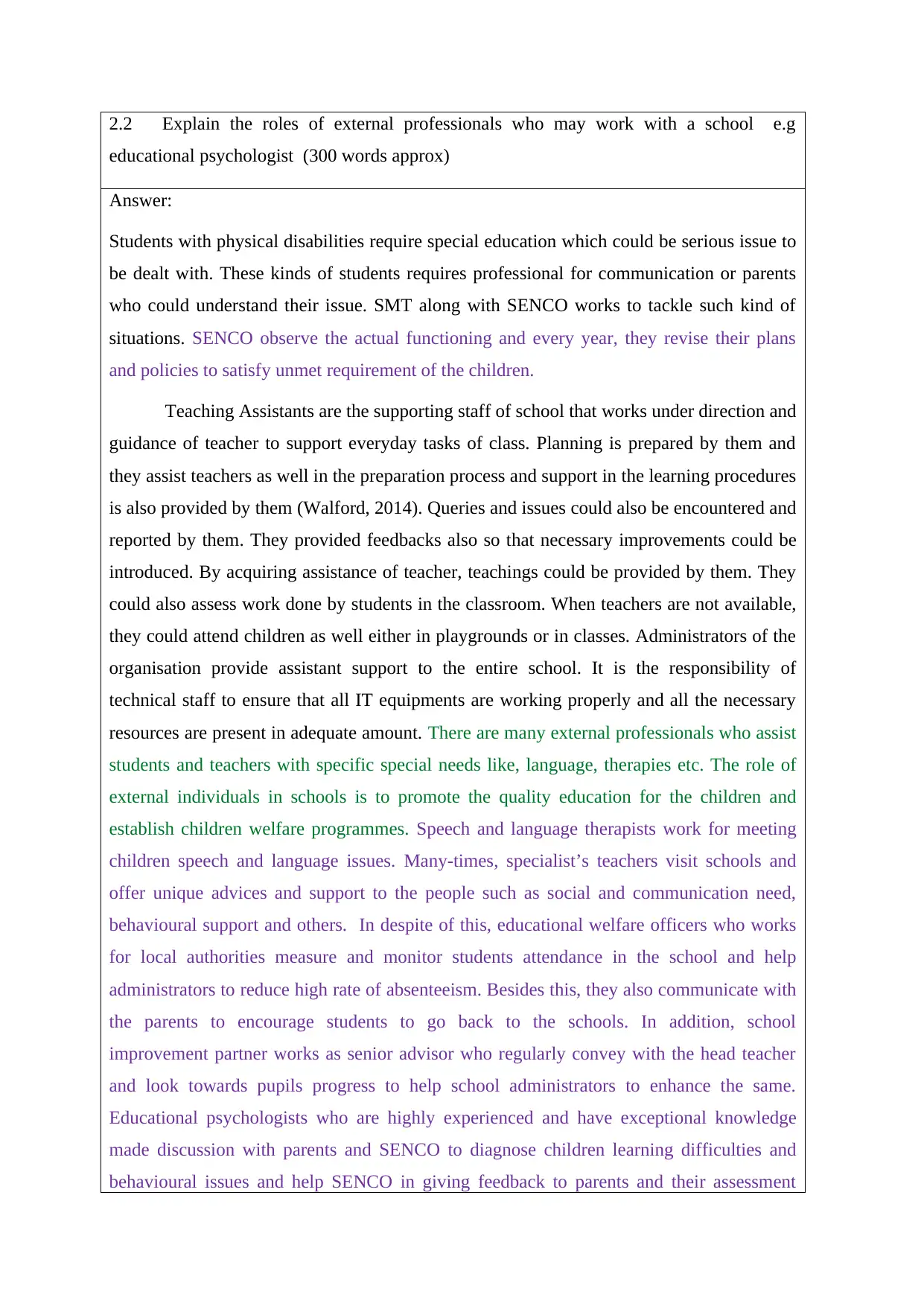
2.2 Explain the roles of external professionals who may work with a school e.g
educational psychologist (300 words approx)
Answer:
Students with physical disabilities require special education which could be serious issue to
be dealt with. These kinds of students requires professional for communication or parents
who could understand their issue. SMT along with SENCO works to tackle such kind of
situations. SENCO observe the actual functioning and every year, they revise their plans
and policies to satisfy unmet requirement of the children.
Teaching Assistants are the supporting staff of school that works under direction and
guidance of teacher to support everyday tasks of class. Planning is prepared by them and
they assist teachers as well in the preparation process and support in the learning procedures
is also provided by them (Walford, 2014). Queries and issues could also be encountered and
reported by them. They provided feedbacks also so that necessary improvements could be
introduced. By acquiring assistance of teacher, teachings could be provided by them. They
could also assess work done by students in the classroom. When teachers are not available,
they could attend children as well either in playgrounds or in classes. Administrators of the
organisation provide assistant support to the entire school. It is the responsibility of
technical staff to ensure that all IT equipments are working properly and all the necessary
resources are present in adequate amount. There are many external professionals who assist
students and teachers with specific special needs like, language, therapies etc. The role of
external individuals in schools is to promote the quality education for the children and
establish children welfare programmes. Speech and language therapists work for meeting
children speech and language issues. Many-times, specialist’s teachers visit schools and
offer unique advices and support to the people such as social and communication need,
behavioural support and others. In despite of this, educational welfare officers who works
for local authorities measure and monitor students attendance in the school and help
administrators to reduce high rate of absenteeism. Besides this, they also communicate with
the parents to encourage students to go back to the schools. In addition, school
improvement partner works as senior advisor who regularly convey with the head teacher
and look towards pupils progress to help school administrators to enhance the same.
Educational psychologists who are highly experienced and have exceptional knowledge
made discussion with parents and SENCO to diagnose children learning difficulties and
behavioural issues and help SENCO in giving feedback to parents and their assessment
educational psychologist (300 words approx)
Answer:
Students with physical disabilities require special education which could be serious issue to
be dealt with. These kinds of students requires professional for communication or parents
who could understand their issue. SMT along with SENCO works to tackle such kind of
situations. SENCO observe the actual functioning and every year, they revise their plans
and policies to satisfy unmet requirement of the children.
Teaching Assistants are the supporting staff of school that works under direction and
guidance of teacher to support everyday tasks of class. Planning is prepared by them and
they assist teachers as well in the preparation process and support in the learning procedures
is also provided by them (Walford, 2014). Queries and issues could also be encountered and
reported by them. They provided feedbacks also so that necessary improvements could be
introduced. By acquiring assistance of teacher, teachings could be provided by them. They
could also assess work done by students in the classroom. When teachers are not available,
they could attend children as well either in playgrounds or in classes. Administrators of the
organisation provide assistant support to the entire school. It is the responsibility of
technical staff to ensure that all IT equipments are working properly and all the necessary
resources are present in adequate amount. There are many external professionals who assist
students and teachers with specific special needs like, language, therapies etc. The role of
external individuals in schools is to promote the quality education for the children and
establish children welfare programmes. Speech and language therapists work for meeting
children speech and language issues. Many-times, specialist’s teachers visit schools and
offer unique advices and support to the people such as social and communication need,
behavioural support and others. In despite of this, educational welfare officers who works
for local authorities measure and monitor students attendance in the school and help
administrators to reduce high rate of absenteeism. Besides this, they also communicate with
the parents to encourage students to go back to the schools. In addition, school
improvement partner works as senior advisor who regularly convey with the head teacher
and look towards pupils progress to help school administrators to enhance the same.
Educational psychologists who are highly experienced and have exceptional knowledge
made discussion with parents and SENCO to diagnose children learning difficulties and
behavioural issues and help SENCO in giving feedback to parents and their assessment
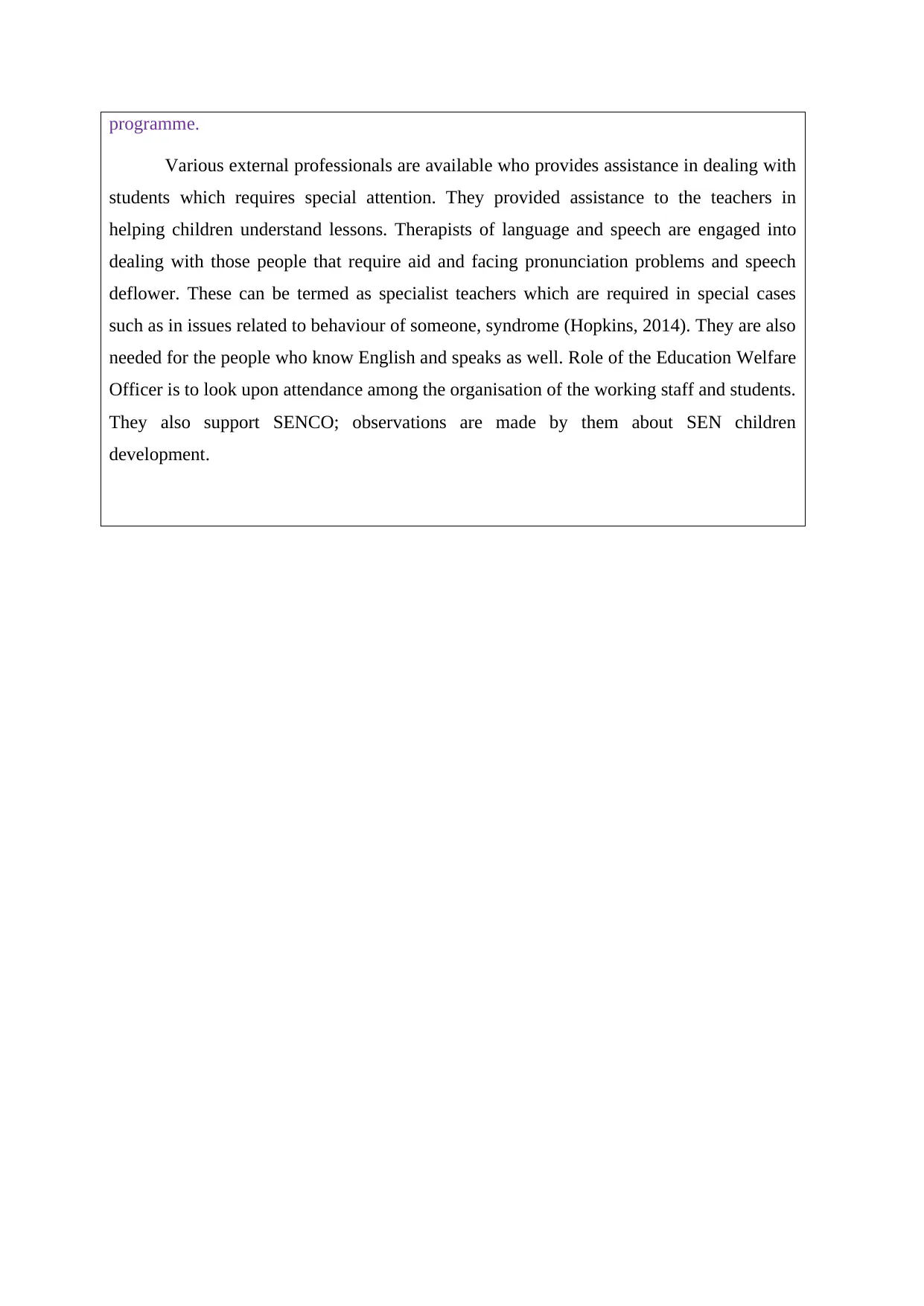
programme.
Various external professionals are available who provides assistance in dealing with
students which requires special attention. They provided assistance to the teachers in
helping children understand lessons. Therapists of language and speech are engaged into
dealing with those people that require aid and facing pronunciation problems and speech
deflower. These can be termed as specialist teachers which are required in special cases
such as in issues related to behaviour of someone, syndrome (Hopkins, 2014). They are also
needed for the people who know English and speaks as well. Role of the Education Welfare
Officer is to look upon attendance among the organisation of the working staff and students.
They also support SENCO; observations are made by them about SEN children
development.
Various external professionals are available who provides assistance in dealing with
students which requires special attention. They provided assistance to the teachers in
helping children understand lessons. Therapists of language and speech are engaged into
dealing with those people that require aid and facing pronunciation problems and speech
deflower. These can be termed as specialist teachers which are required in special cases
such as in issues related to behaviour of someone, syndrome (Hopkins, 2014). They are also
needed for the people who know English and speaks as well. Role of the Education Welfare
Officer is to look upon attendance among the organisation of the working staff and students.
They also support SENCO; observations are made by them about SEN children
development.
⊘ This is a preview!⊘
Do you want full access?
Subscribe today to unlock all pages.

Trusted by 1+ million students worldwide
1 out of 45
Related Documents
Your All-in-One AI-Powered Toolkit for Academic Success.
+13062052269
info@desklib.com
Available 24*7 on WhatsApp / Email
![[object Object]](/_next/static/media/star-bottom.7253800d.svg)
Unlock your academic potential
Copyright © 2020–2026 A2Z Services. All Rights Reserved. Developed and managed by ZUCOL.




